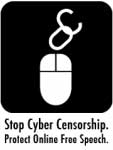
Today is World Day Against Cyber Censorship. In a world of anonymous commenting, pirated movies, and 4chan, some may ask, what is cyber censorship? It manifests itself in a variety of forms, and this week The New York Times and others highlighted the removal of certain censorships that prohibited technology companies from exporting their products and services to Sudan, Iran, and Cuba.
If you happened to catch the news stories, you would have seen this couched as the "lifting of certain sanctions" against these countries. The removal of such sanctions ostensibly allowed tech companies like Microsoft, Yahoo, and Twitter to begin offering locally customized versions of their services in these markets.
It would be logical to assume then that a person going online in one of these countries would have previously been unable to access Hotmail or send their latest Tweet off into the cloud. However, this is not actually the case and that should come as no surprise to anyone who recalls the State Department asking Twitter to delay scheduled maintenance last summer during the Iranian election. The nature of the internet is such that if an online product is publicly available on the web, anyone can access it from any location. That is, as long as their government or internet service provider does not censor the content, in the more palpable form of "cyber censorship" that many of us initially conjure up when we hear the term.
On World Day Against Cyber Censorship, it’s important for us to see beyond these more obvious forms of cyber censorship and also examine subtler manifestations that are evidenced in such moves by the U.S. government. By previously barring consumer web companies from customizing their already accessible online products for these regions, the U.S. government was implicitly depriving these citizens of the means of expression that could prove so valuable. While the Obama administration has now realized the national security gains to be had from relaxing certain censorship, we should not forget that this happened only after these tools had been mainstream for years and could have been more effectively used in a variety of conflict zones had they been tailored to the local region when it mattered.
This reality is only more heartbreaking on the eve of the highly controversial Sudanese election. With less than a month before polling begins, it’s unlikely that these platforms and services will be optimized for the small percentage of Sudanese civilians that could actually make use of them. Because of the quiet American cyber-censorship that has existed for years, activists and civil society members in Sudan will not have access to highly developed and optimized tools that could aid their efforts to form an effective democracy.
On World Day Against Cyber Censorship, let’s call for an end to the notion that any government, for any reason, can or should restrict the right of global citizens to communicate and access information. For whatever reason, to whatever end, access to communication tools are a fundamental human right.

